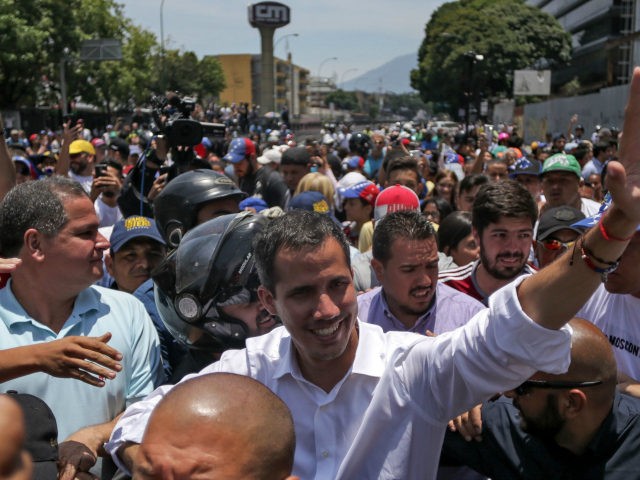President Juan Guaidó insisted in an interview late Wednesday that Venezuela is “close” to ousting dictator Nicolás Maduro and restoring democracy a day after launching what he called the “final” push to assert control over the nation’s military and, ultimately, the presidential palace.
Guaidó told Fox Business’s Trish Regan Wednesday that his supporters will “remain in the streets” as long as it will take to remove the socialist Maduro dictatorship, which has entrenched itself in Miraflores, the presidential palace.
“It’s very close … we remain in the street because we remain united and the armed forces are listening to us, this message of unity, of progress,” Guaidó said. “We are very close to achieving our freedom.”
The president lamented that he could not give “a specific date or time” for the liberation of his country: “these processes of democracy, they have always taken time.”
Guaidó extended his thanks to America and the Trump administration for “their determination to defend democracy in [his] region,” calling support from the free world “very important.”
“We move forward and we know we have the support of the United States and the international community,” he said.
Late Wednesday night, Guaidó posted on Twitter that opponents of the socialist regime had organized 397 protests nationwide even though his presidential office had only set up 97 meeting spots. He also published a map of the locations showing that Maduro’s soldiers “brutally repressed” 23 of the rallies:
#1M 397 manifestaciones en toda Venezuela, 97 puntos de concentración, 23 de ellos brutalmente reprimidos, arrojando 32 detenidos y 25 heridos.
Estamos ante un régimen que perdió el control. Mientras más somos en las calles, más cerca estamos.#VamosConTodo pic.twitter.com/jGzK7oENR3
— Juan Guaidó (@jguaido) May 2, 2019
Guaidó also announced that “Operation Liberty,” as he calls his movement, would not end, despite the rampant use of violence on the part of soldiers loyal to Maduro.
“The coward regime tries to demonstrate with focused repression a control it no longer has,” he wrote on Twitter. “It has no answers, it has nothing. They saw themselves weak yesterday and today they are even moreso, because Venezuela is going all in on the streets.”
Early Tuesday morning, Guaidó appeared in a live video on social media at La Carlota airbase near Caracas, flanked by longtime political prisoner Leopoldo López. López is the leader of Guaidó’s socialist Popular Will party and was arrested and sentenced to 13 years in prison in 2015 for organizing peaceful protests (“terrorism”). López, who had been under house arrest until that moment, said that the secret police officers guarding him had agreed to free him as a gesture of defiance against Maduro.
Guaidó claimed Tuesday morning that he had finally convinced the military to stop supporting the dictator but that civilians would have to flood the streets to protect the soldiers from the higher ranks who remained loyal. Maduro responded in a speech late Tuesday flanked by his defense minister and senior generals, who all vowed loyalty to the socialist dictator.
As of Thursday morning, Maduro remains in Miraflores.
Two protesters – 24-year-old Samuel Enrique Méndez and 27-year-old Jurubith Rausseo García – have been confirmed dead, while non-governmental groups (NGOs) on the ground have tallied up at least 130 injuries. The Venezuelan Penal Forum NGO reported late Tuesday that Maduro had taken 168 political prisoners since Guaidó announced the uprising, among them 13 described as adolescents.
Footage from the ground on Tuesday showed Maduro’s soldiers shooting at unarmed protesters, firing tear gas canisters at them, and using armored vehicles to run over them.
Maduro, who had not appeared in public since Guaidó’s actions but had delivered a speech from Miraflores on Tuesday, resurfaced early Thursday in front of a group of soldiers marching through Caracas.
“We must awake, enliven, the sacred fire of the value of the Venezuelan soldiers to the combat we are waging against imperialism, against traitors and coup plotters,” Maduro announced.
https://twitter.com/NicolasMaduro/status/1123892609422954497
Guaidó became president of Venezuela in January after Maduro’s last term expired. Maduro claims that he remains president because he “won” an election a year ago in which he banned non-communist opposition candidates from running and used the military to physically threaten voters. Given the illegitimacy of the election, the federal legislature used its constitutional powers to appoint an interim president, Guaidó, whose mandate allows him to restore democratic order and schedule free and fair elections.
Guaidó has been unable to schedule elections, however, because Maduro refuses to leave. Backed by Russia, Cuba, and other rogue regimes, Maduro has managed to maintain control of the police and military, attacking protesters with force or imprisoning them to keep power.

COMMENTS
Please let us know if you're having issues with commenting.